Real Estate Document Management Software: Which is the Best?

Did you earn $165 bln or failed to close the deal because of the paperwork flux?
In 2021 the USA Real Estate Sales & Brokerage industry will reach $164.8 bln of revenue, staying one of the most lucrative sectors of the economy with 17.5% of GSP in 2019, according to the National Assoсiation of REALTORS.
This means that someone continues to sell while someone else buys, leases, and rents. Covid-19 moved everyone to the remote mode, and the documentation that cluttered up the work desk moved home too.
The market abounds in ready-made solutions of real estate electronic document management. Whether they cover your needs or you will have to develop one from scratch, read on to find out.
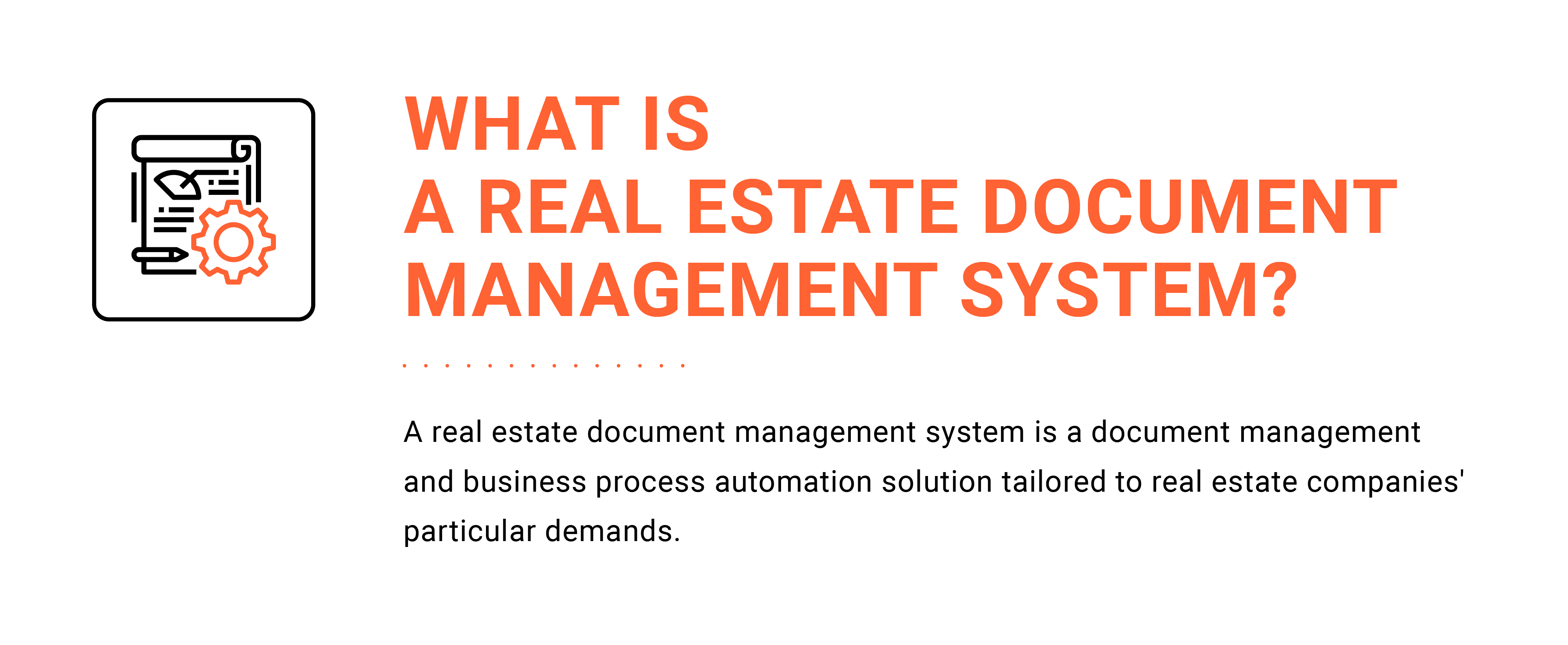
A real estate DMS serves as a working environment, storage, and organizer of the real estate representatives’ activity, providing the climate for the right decisions due to paperwork automation.
Real estate document management needs
The permanent influx of titles, contracts, appraisals, loan agreements, rental and tenant information, sales reports, and other real estate documentation that requires to be processed on time.
There are some document needs that the industry feels in 2021.

Managed workflow

It is complicated to control a real estate agency on paper lacking a robust workflow as a part of real property DMS. Technological unsophistication of the industry starts with a legacy email-dependant way of collaboration that does not complete the picture. A slick rule-based tool for business process coordination can reverse the situation.
Digital documentation

Coping with bundles of paper causes an inevitable mishmash with storage, lack of version control, slowing down document processing, retrieving valuable information, etc. High human dependency, in this case, can provoke mistakes and risks of file duplication. Brokers notice that going paperless brings relief with document creation, editing, approval, signing, and storing in electronic view. Investors are of the same mind in their tension to try digitization of a commercial real estate investment document management system.
Access to the documents

A lack of a single information environment for property-related files slows down the agency’s operation. The collaboration that converts to revenue requires easy access to the documents with a sharing option. A single system where all the deal participants can check document status, be notified about changes, and do it on the go under the role-based control affects the result.
Data protection and security

On average, a data breach may cost a company around $3.9 mln, as IBM stated in the report. Going digital imposes an obligation on real estate firms to care about the client’s personal information secrecy at the uttermost. Under the EU-wide law GDPR and federal rules varying widely from state to state in the US, they are enforced to process and keep sensitive financial and personal data securely.
It is the case for software vendors to be compliant with established data protection principles. Our guide to the General Data Protection Regulation works out in detail it all
Cost-effective storage

From a financial perspective, implementation of the real estate document management software makes sense as well. Excessive expenditure for shelving is not a norm in times of affordable web and cloud services. Having digital document storage is a long-lived solution that pivots the familiar approach of document management in real estate.
Work productivity boost

As real estate professionals tackle to improve their efficiency, the industry is seeing a rise of paperless tools to close deals faster. It may foster competitiveness and be highly acceptable by agencies aiming to eliminate mistakes that often happen on paper documents. A modern, streamlined property renting or buying process is an excellent supplement for other digital resources here to stay.
Remote and contactless

Pandemic implications were reflected on the consumer buying experience as well. Preferences to have fewer live person-to-person meetings concern paperwork. The real estate electronic document management can make it comfortable and transparent. The industry walked through the door of the new era. Usual in-person interaction shifts towards remote digital experience between agents and clients.
Types of real estate DMS
With the automatization of work a need came for digital management of paperwork. The market abounds in complex solutions with the DMS option for various activities in real estate.
Depending on the purpose, the real estate software are of the following types:
- covering commercial real estate investment needs;
- brokerage-oriented software;
- investment management solutions;
- property management systems;
- sales management in real estate;
- customer relationship management in real estate.
Almost all of them include the option of a document management system for real estate.
5 reasons why a business needs a document management system and how to choose the best fit for your business size
Must-have real estate DMS features
You might want to fill the gap with document management routine seeking software. The option you need more can’t be in the package with a multiplicity of features though. That’s why some systems can’t fit you well. Let’s walk through the must-have features in a real estate document management system to uncomplicate the task.
Workflows in real estate
Workflows are of utmost importance in managing property management processes that are like a spider web at first sight. Consider a real estate agent document management solution able to provide the creation of several workflows to cover the needs in keeping track of deal stages, lease renewals, inspections, etc.
Automation of business processes in real estate companies leads you to the frontier of customer service, which is the competitive advantage in the information-intensive industry. Workflows establish a work process according to the company’s standards enabling users to review, approve, sign, collaborate on documents collectively or as a single user.
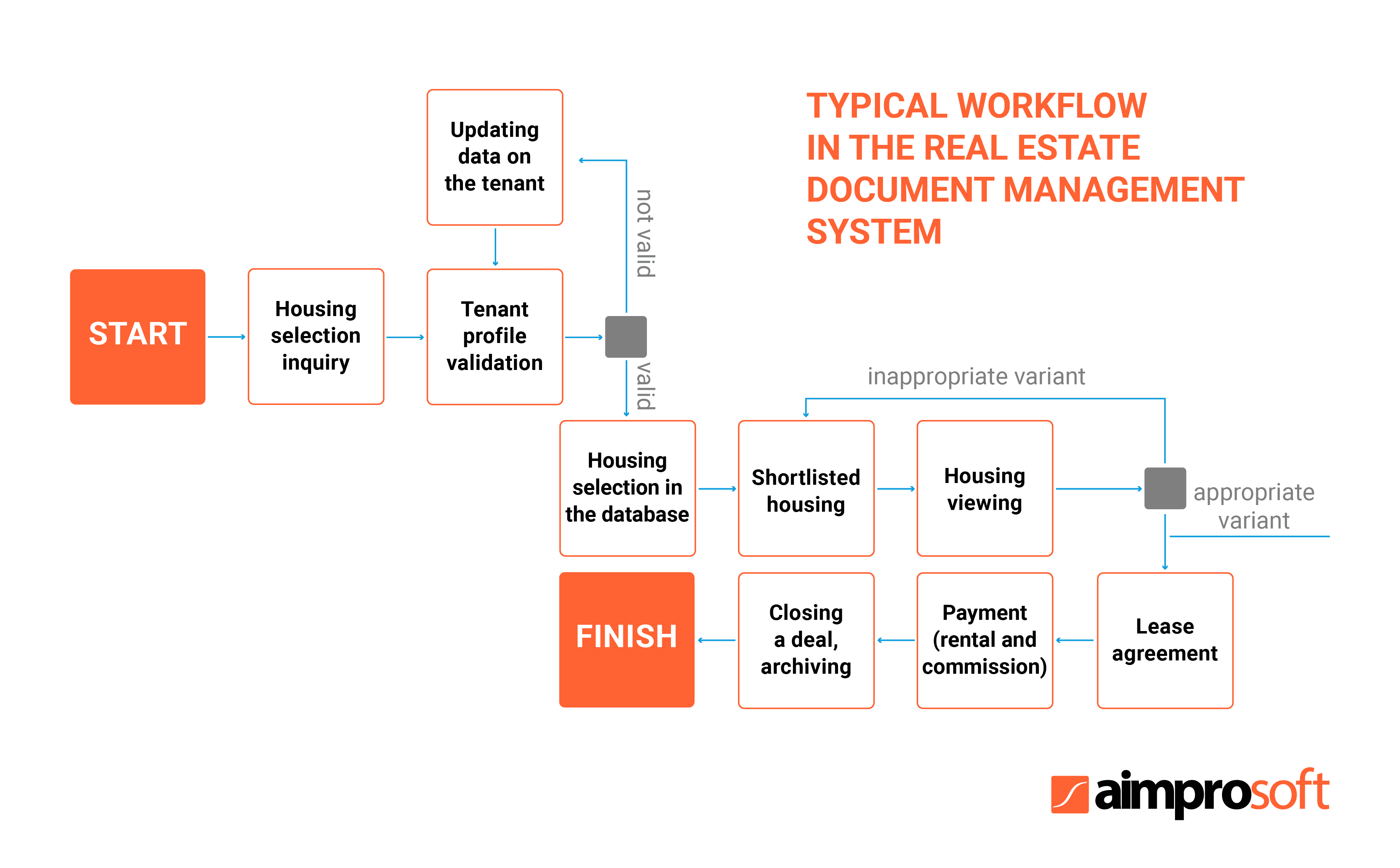
Real estate document processing
A long paper document processing steals many valuable hours that can be devoted to engaging new clients. Automation helps real estate agents and investors cope with pre-approvals, offers, leases, disclosures, property brochures, and other associated documents more straightforwardly.
As a core feature of an excellent commercial real estate document management, it allows greater document search, extraction, uploads, generation, tagging, amending, roles and permissions change, and files transfer between the content management system’s folders due to the digital transformation of paper files. They look like original ones and work better, though. Also, it may include integration with reporting tools, tenant verification systems, notifications, etc., to advance document processing.
Document management and storage
Being occupied with clients on residential and commercial markets, any agent wants to get property documents managed and stored most properly. Files access, tracking, and storage are possible within a robust property document management system, which is a highly regarded option.
Swipe, choose, click. That is exactly the way of how it can be working with electronic document management. A single knowledge hub can become a great alternative to separate shared clouds, local disks, and messengers with attached files in history. Modern solutions allow you to arrange folders, tag files with metadata, and enjoy it on the nice web user interface.
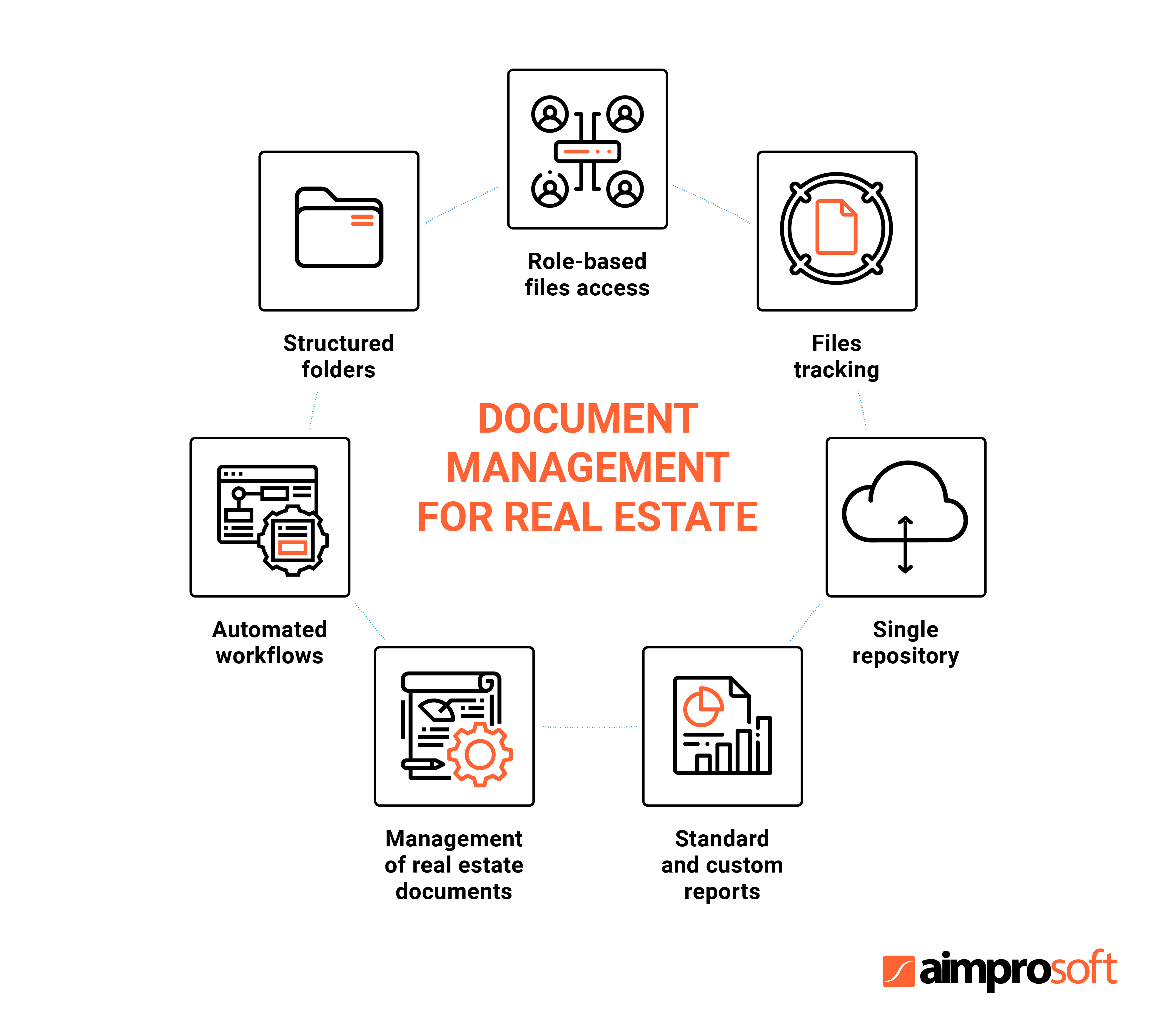
Version control
According to a frank report from NAR, only 18% of realtors use document storage and transaction management software. Therefore, it must be concluded that the rest 82% in the industry are at risk of losing the last modified document version while sending it back and forth under the approval necessity.
A version control option benefits users, which is well above their expectations. Agents and brokers can take complete control of the document working cycle and always know where the last modified version is. It is a highly regarded function for the real estate business with a heavy inflow of paper files with a need in the history of changes, revision, version control standardization, and others.
Permission management
In the real estate practice, agent agreements, lease agreements, purchase agreements, seller disclosures, and other associated documents are read, edited, amended, and approved by the deal participants. The permission management feature turns to be an integral part of any document management system for real estate.
Permission-oriented software gives users of one business unit more maneuver with content while denying access for any outsiders. It is quite critical to assign tasks to people with respect to their business roles.
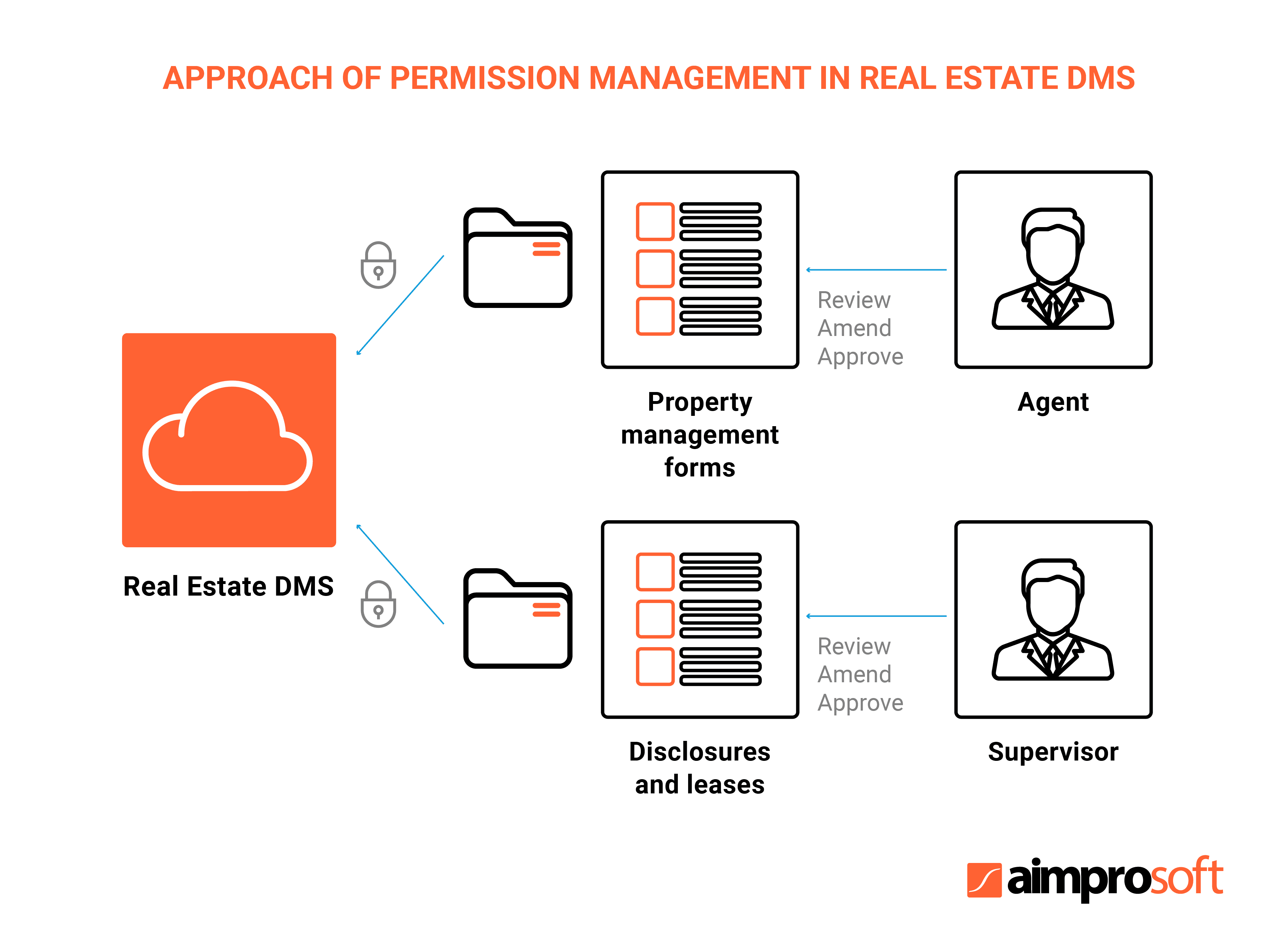
Tagging
Real estate firms have to maintain documents archived for a specified amount of time. The most relevant storage structure is by type of document. Tagging helps classify files by orders, inquiries, payments, etc. Paired with metadata (marked by tenant, leaser, cost, date, etc.), it provides comprehensive information on the deal.
Therefore, a respective tagging by certain attributes is needed to take out archived documents multiple times instead of wasting business hours for search. This feature standardizes a digital document uploading and entry for an effortless file search.
Ready-made solutions vs. custom development
In relation to the technical side of the real estate software, the situation is rather straightforward. There are two options: off-the-shelf systems and custom solutions with peculiarities worth to be considered for both.
Custom or individual development is a unique solution created for specific customer tasks. Custom development or out-of-the-box solution is a standard product for a wide range of users.
Ready-made solutions
Ready-made systems attract digital-tolerant entrepreneurs by the following pros:
- Quick start of a viable system to save efforts on routine.
- Relatively low upfront cost.
- Proven by existing users, confirmed with testimonials.
- Updated technology stack.
- Experience of many real estate companies in a single solution.
- Implementation and support easier and affordable.
Factors that may make you hesitate are here to stay as well:
- Technical dependence on one real estate software development company.
- Requested features beyond the start package may be long down the list of implementation.
- Affordable subscriptions (SaaS) may hide costly customer support or customizations.
- Intensive marketing pressure to upgrade the subscription model.
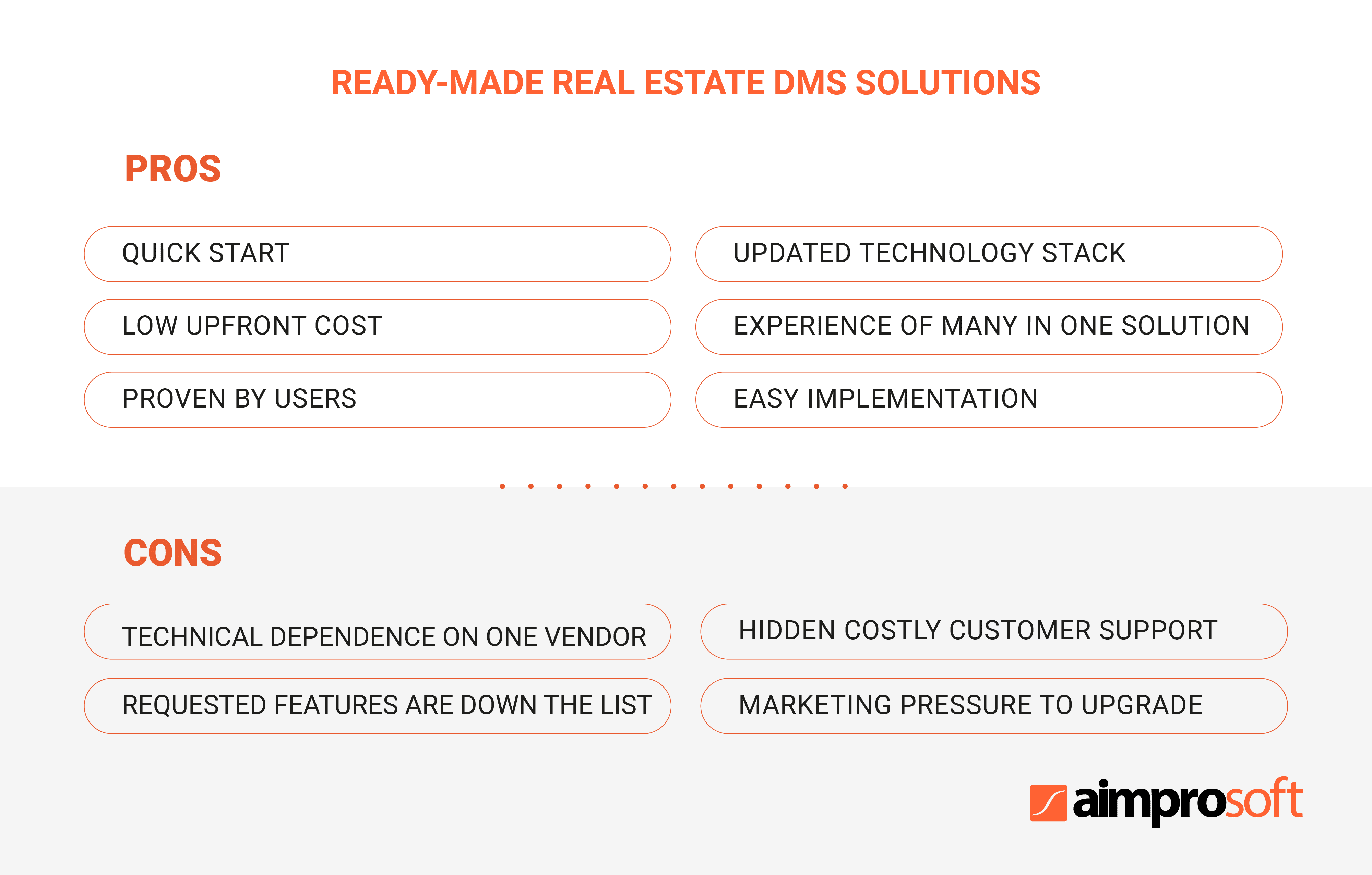
Among off-the-shelf solutions is Alfresco, CoStar Real Estate Manager, Moxtra, which are complex solutions covering different business process needs of agents and realtors with an option of document management.
Brokerage Engine, Apto, and Broker IDX Sites software automates real estate brokerage document management as an option focusing more on broker tasks.
Transformational Alfresco solutions for real estate agencies: business automation, document management, digital storage
Custom development
Custom solutions have clear advantages over ready-made software that are:
- Solutions under specific real estate demands.
- Wider set of features beyond the standard package .
- Adjustment to all business-processes and even the most complex.
- Faster staff adaptation period comparatively to ready-mades.
- Flexible to changes during development.
However, there is a range of drawbacks to balance the thoughts:
- Long period of integration.
- High spendings for the development.
- Custom system is limited to on-premise deployment.
- At the risk of not meet expectations after extensive efforts.
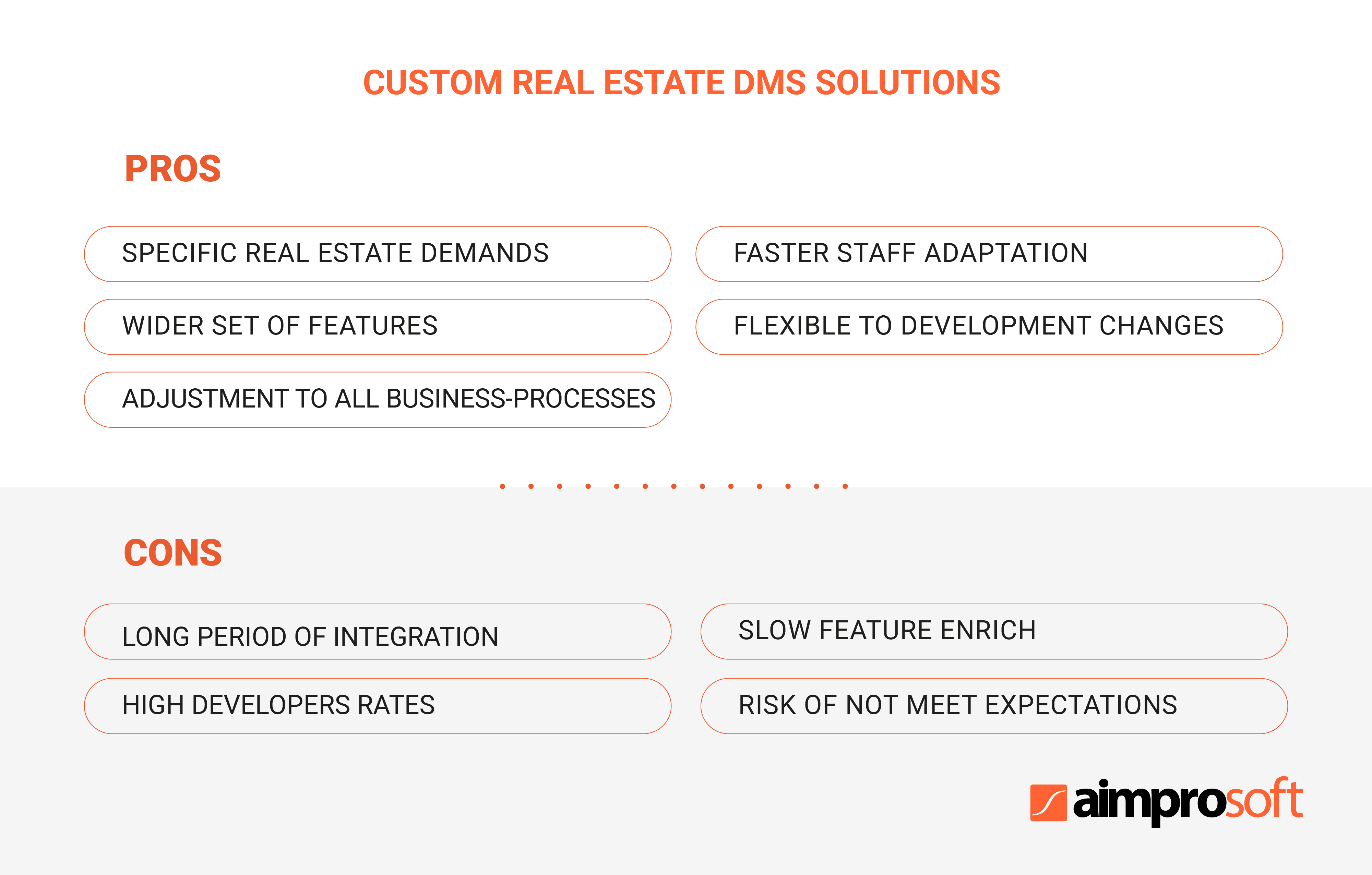
Summarizing, ready-made solutions are best for a quick start with a document-driven collaboration online, for those constrained with a budget and pretty fairly simple requirements. Custom solutions win for specific company tasks when the ready-mades seem to be the only possible solution to fix the things.
However, you do not need to change your working style with out-of-the-box solutions that are yielded to be tuned to your needs during the setup process. Keep on reading to know more about top DMS for real estate.
We’ve helped grow a real estate startup from Koln that provides online services on finding apartments for extensive stays for business travelers
Top 5 Document Management Systems for Real Estate
With attention to every detail, each software below brings a combination of document management functions, industry-specific features, business process management; all of them put client satisfaction to the fore. Below is an overview of five software solutions, which may help you single out the best real estate document management representatives.
| FolderIt | DocStar | Apto | Brokerage Engine | Alfresco | |
|---|---|---|---|---|---|
| Price | $23/per month | Upon request | $129/month/user | Upon request | Depends on the package |
| Free version | No | No | No | No | Yes |
| Coverage of needs | Security conscious businesses | Real Estate content managemen | Commercial Real Estate Brokerage teams and offices | Residential Real Estate Brokerages | Real Estate document management needs of all types |
| Demo/Trial | Free | Video review | Free | Free | Free |
| Support | Online | Business hours, online | Business hours, online | Business hours, online | Business hours, online for Enterprise Edition |
| Purpose | General use | ECM focus | Very task specific | Very task specific | General use, highly customizable |
| DMS features | As an option | Main focus | As an option | As an option | Main focus |
| BPM features | Not available | Module | Not available | Not available | Main focus |
| Size of business | Any | Midsize | Any | Any | Any |
| Customization | No information | No information | No | No | Easy adaptive |
| Deployment | Web-Based, Cloud, SaaS | Web-Based, Cloud, SaaS, Mobile, On-Premise | Web-Based, Cloud, SaaS | Web-Based, Cloud, SaaS | Web-Based, Cloud, SaaS, Mobile, On-Premise |
| Choice of customers | Security | Feature rich | Easy to use | Extremely user-friendly | Turnkey solution |
There is no dedicated commercial real estate investing document management software, for example. DMS is a comprehensive solution that is a part of an automation system with a strong focus on document management above all. One way or another, all of them serve for advanced coordination a daily routine with documents.
If you feel good about customizations, Alfresco is a universal tool that has proved to be excellent among other market representatives. In the case you need a custom system, Alfresco is the only variant that, other things being equal, will be onboarded in a week, easy, at a reasonable cost, and best fit.
Still hesitating? The overview of Alfresco solutions and benefits for business may help you to decide
How much does it cost to develop a real estate document management?
The market offers real estate ERP, transaction, or property management systems packed with excess features, including DMS as an option. Since most of the functionality potential of cumbersome software remains untapped, the implementation and maintenance spendings for the sake of document management seems to be unreasonable, while the main challenge is document management and workflows.
Based on our sound experience with Alfresco solutions, it will be enough out-of-the-box features of Alfresco to cover the greater number of operational needs of real estate agents, realtors, and brokers. Later, we can develop additional modules to meet specific requirements in each case. The basic Alfresco installation takes from 40 to 80 hours and will cost you $1400-$2800 for a start.
Reach us and we will provide you with cost you can start your transformation.
TALK TO USHow to implement real estate document management with Aimprosoft?
Often real estate entrepreneurs choose Alfresco as an overwhelming tool to coordinate document management, electronic storage, and workflow management.
Case: Housing company from Belgium
Our client from Belgium started the business, which was very niche at the early beginning. The housing company that rents out houses and apartments to tenants began to grow, demanding to accelerate operation soon to run the business more effectively and stay competitive.
Aimprosoft’s team delivered an implementation of Alfresco document management system to approve their documents (invoices, request for prepayments, rental and tenant information, etc.) in a structured way and store the processed documents logically.
We added document statuses to differentiate tasks among user roles for documents in the work folders and the archive folders. Statuses for working folders (In Process, On Hold, Update, Partial payment, Proof, Approved, Rejected, and others) helped set up a strict document processing under the rules of the custom company’s workflow.
Integration with Ephesoft allowed users to unlock unstructured content entering PDF documents with their metadata (coming from Ephesoft) into Alfresco. Also, we used this integration to transfer archived paper-based documents into Alfresco digital storage.
We achieved something more than of substantial benefit. Challenging with chaos, our client shifted towards strictly organized business with complete access to documents and processes from anywhere within a secure space.
Conclusion
Disregarding timely digital transformation, businesses face insurmountable challenges inevitably on the way to grow. Real estate businesses need a little help along the journey from paper-dependency to digital freedom. We can start with business analysis to define your business’s pain points, proceed with a statement of work to record your requirements, and make Alfresco work for you.
Those who are open to penetrate digital technologies right and respect the necessary human contact of sufficient quantity will flourish. Are you in? Contact us.




